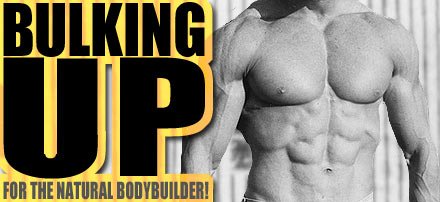 | In order for a bulk up phase to be effective, it needs to be executed properly. This article will provide a detailed plan on bulking up in the off season; plans included are for beginners, intermediate, and advanced. Check it out! |

By: Hugo Rivera
During winter, most bodybuilders decide to bulk up, which in simple terms means eating more and training heavier in order to gain muscle. However, in order for a bulk up phase to be effective, it needs to be executed properly. Otherwise, you end up gaining way too much body fat, which at the end of the day, whether you just want to look good for the beach over the summer or compete at a bodybuilding show, you will need to lose anyways.

When To Bulk Up
First of all, bulking up is not about eating everything in sight and trying to lift as heavy as possible hoping that all of the increased weight gain will come in the form of muscle. This old school strategy will only lead to excessive fat gain.
The best time, in my opinion, to bulk up is after you have been dieting for a long period of time. At this time your body will act like a sponge and absorb all of the nutrients that you give it at peak efficiency in response to the fact that it has not been getting such an influx of nutrients for a while.
Also, if you are above 10% body fat, in which case you cannot see your abs, then you need to concentrate on losing body fat up until the point (at the very least) where you can see the top two rows of abs (when you have a four pack).
Your bulk up plan will work even better, however, if you get down to where you can easily see your full abdominal wall (which is around 6-7% body fat for most people) as when you increase calories in this state, your body will be more primed to gain most of the weight in the form of muscle mass in response to the low calorie period that came before it.

Bulking Up Basics
Having said that know that while most of the weight that you will gain will be in the form of muscle, some of it will be in the form of fat no matter how good your diet is.
The reason for that is the fact that on a state of caloric surplus (when you feed your body more calories than what is burned) some of those calories are stored as body fat. However, by bulking up on good foods, by training hard and by starting from a low percentage of body fat, you will minimize the fat gain and maximize the muscle mass gain.

Bulk Up Diet:
Now that you know what to expect from a bulk up cycle, let's cover how to design a bulk up diet:
 Protein:
Protein:
Increase your protein intake to 1.5 grams of protein per pound bodyweight. Therefore, if you weigh 200 lbs, you need to eat around 300 grams of protein per day. I have noticed that if I eat more than 40 grams of protein in one sitting I feel lethargic and have issues digesting the food.
Therefore, divide 300 by 40 and that will give you the amount of meals that you need to eat per day. In this example, the 200-lb bodybuilder will need to eat, around 7-8 meals per day spaced out with a minimum of 90 minutes in between meal and a maximum of 3 hours.
Protein Needs Calculator Enter your body weight (in pounds or kilograms) and press "Calculate".
- Chicken
- Turkey
- 93% Lean Red Meats
- Tuna
- Egg Whites
- Salmon
Protein sources should come from lean low fat sources like:
 Carbs:
Carbs:
Increase your carbohydrate intake to between 1.5-2 grams of carbs per pound of bodyweight. In order to gain muscle, a carbohydrate increase will be required to keep your energy levels high, and thus fuel your workouts, and in order to help shuttle the amino acids from your proteins into the muscle tissue (since carbohydrates increase insulin levels and insulin is necessary for the transport of the aminos into the muscle).
The key thing to ensure that muscle mass is maximized as opposed to fat gain when consuming carbohydrates is to ensure that your intake of them is mostly from low glycemic (low digesting/released carbs) like brown rice, oatmeal and sweet potatoes.
Limit the simple, higher glycemic carbs for after the workout when the body needs fast released carbs and proteins in order to quick start the recovery and re-building process and also to help refuel the energy stores (glycogen levels in the muscle and liver) that have been drained.
Also, ensure that you eat half of your carbohydrates split between the times that the body is most receptive to them, which is the morning time (first meal) and post workout time. So for instance, our hypothetical 200-lb bodybuilder who is starting his bulk up plan at 300 grams of carbs per day (bodyweight x 1.5), will split 150 grams (half of the daily requirement) between the morning meal and the post workout meal (so that comes to 75 grams of carbs).
The morning meal carbs will be complex low glycemic carbs while the post workout meal will be half simple and half complex). The remainder 150 grams will be split in the remainder meals.
Carb Needs Calculator Enter your body weight (in pounds or kilograms) and press "Calculate".
I always advise to refrain from eating complex carbs after 6:30pm (unless your post workout meal comes after that time) as your insulin sensitivity (body's acceptance of the hormone insulin) goes down at night and therefore, one runs a higher risk of storing carbohydrate calories at night unless you train, in which case your insulin sensitivity is optimized.
Finally, make sure that you have around 15-20 grams of fibrous carbohydrates, such as green beans or broccoli, at lunchtime and 15-20 grams more at dinnertime as these will help to keep your digestive tract clean and ready to accept new nutrients, thus maximizing nutrient utilization.
 Fats:
Fats:
Increase your intake of good fats. Some fats are necessary to ensure good hormonal production and thus muscle growth. Eliminate all fats and see your testosterone levels take a dive. The body needs fats like the Omega Essential Fatty Acids in order to ensure proper hormonal production and brain function.
These oils are essential because the body cannot manufacture them and they help with many things like enhanced recovery due to reduced inflammation, enhanced nutrient partitioning due to their ability to neutralize enzymes necessary for fat storage (so this means more calories go toward muscle production and less to fat) and even help with enhancing your mood!
In order to get your good fats keep the essential fats at 3 tablespoons per day for guys and 1.5 for women in the form of flax seed oil, fish oils or extra virgin canned olive oil. I split my fats between my two low carbohydrate meals, which are meal 7 and 8. The reason I like to do this is because they eliminate my cravings for sweets at night that come as a result of the reduced carbohydrate intake at this time.
Also, if I eat the fats earlier in the day with my carbohydrates, they completely kill my appetite and make it hard for me to consume the amount of carbohydrates that I need to eat.

Training
Depending on your schedule and your level of experience training will take from 3 days a week to 6. Each workout session should be limited to no more than 60 minutes of intense weight training. More time in the gym and your testosterone levels will suffer.
Click on the links below to access a suitable bulk up training routine that is in accordance to your training experience:
 Bulk Up Routines:
Bulk Up Routines:
- 75 Degree Incline DB Bench Press
- DB Bench Press
- One-arm Rows
- DB Pullovers
- Bent-over Lateral Raises
- DB Upright Rows
- Dumbbell Curls
- Overhead Triceps Extensions
- DB Squats
- DB Lunges
- Stiff-legged Deadlifts
- Calf Raises
- 75 Degree Incline Press
- Flat Dumbbell Press
- Incline Flyes
- One-arm Rows
- Two-arm Rows
- Pullovers
- Dumbbell Curl
- Incline Curls
- Overhead Triceps Extensions
- Lying Tri Ext
- Squats
- Lunges
- Leg Extensions
- Stiff-legged Deadlifts
- Leg Curls
- Calf Raises
- Sit Ups (Go up to a 30 degree angle only)
- Leg Raises
- Swiss Ball Crunch
- Knee-ins
- Superset:
- Superset:
- Upright Rows 10 sets x 10 reps (1 minute rest)
- Superset:
- Superset:
- Calf Raises on Leg Press Machine 10 sets x 10-20 reps (30 second rest)
- Modified Compound Superset:
- Modified Compound Superset:
- Modified Compound Superset:
- Modified Compound Tri-set:
- Modified Compound Giant-set:
- Modified Compound Superset:
- Modified Compound Superset:
- Modified Compound Superset:

Beginner Routine:
3 Days A Week Full Body Routine.
(Perform on 3 non-consecutive days such as Mon/Wed/Fri)
NOTE: DB = Dumbbell
How To Progress:Perform 2 sets of each exercise for 10-12 reps and rest 1 minute in between sets. Move up to 3 sets after 4 weeks. At 2 sets per exercise the routine lasts 45 minutes if you rest 1 minute in between sets. At 3 sets it lasts 60 minutes. Do cardio on the days off (20-30 minutes) and also do abs (4 sets of Leg Raises and Swiss ball crunches for 15-40 reps).
 Click Here For A Printable Log Of Beginner Routine.
Click Here For A Printable Log Of Beginner Routine. Click Here For A Printable Log Of Beginner Routine Progression.
Click Here For A Printable Log Of Beginner Routine Progression. Click Here For A Printable Log Of Abs Routine.
Click Here For A Printable Log Of Abs Routine.

Intermediate Routine:
If you have been training for at least 12 weeks, then this is the routine that is best suited for you. In this routine, upper body and lower body are split in two separate days. Also, a leg extension/leg curl attachment will be required for those working out at home.
Day 1-Upper Body
Day 2-Lower Body
How To Progress:
This routine can be performed either 4 days a week by doing Day 1 on Mon/Thur and Day 2 on Tue/Fri with cardio on Wed/Sat or alternatively 3 non-consecutive days a week like Mon/Wed/Fri alternating between Day 1 and 2, with cardio in the days off. Perform 2 sets of each exercise for 10-12 reps and rest 1 minute in between sets. Move up to 3 sets after 4 weeks. At 2 sets per exercise the routine lasts 45 minutes if you rest 1 minute in between sets. At 3 sets it lasts 60 minutes.
 Click Here For A Printable Log Of Interm. Routine First Four Weeks Day 1.
Click Here For A Printable Log Of Interm. Routine First Four Weeks Day 1. Click Here For A Printable Log Of Interm. Routine Four Weeks Day 1 Progression.
Click Here For A Printable Log Of Interm. Routine Four Weeks Day 1 Progression. Click Here For A Printable Log Of Interm. Routine First Four Weeks Day 2.
Click Here For A Printable Log Of Interm. Routine First Four Weeks Day 2. Click Here For A Printable Log Of Printable Log Of Interm. Routine Four Weeks Day 2 Progression.
Click Here For A Printable Log Of Printable Log Of Interm. Routine Four Weeks Day 2 Progression.

Advanced Routine:
This routine requires at least a year of consistent training under your belt. While this is the way that I perform it, if you can only train 5 days a week, them just keep rotating Days 1, 2 and 3.
Weeks 1-3: Loading Phase.
Day 1 Chest & Back (Monday/Thursday)
- Incline Dumbbell Bench Press 10 sets x 10 reps (No rest)
Close Grip Pull-up (Palms facing you) 10 sets x 10 reps (1 minute rest)
- Swiss Ball Crunches 4 sets x 10-25 reps (No rest)
Leg Raises 4 sets x 8-20 reps (1 minute rest)
 Click Here For A Printable Log Of Weeks 1-3: Day 1 Chest & Back.
Click Here For A Printable Log Of Weeks 1-3: Day 1 Chest & Back.
Day 2 Shoulders & Arms (Tuesday/Friday)
- Incline Dumbbell Curls 10 sets x 10 reps (No rest)
Overhead Dumbbell Triceps Extensions 10 sets x 10 reps (1 minute rest)
Day 3 Legs (Wednesday/Saturday)
- Leg Press 10 sets x 10 reps (No rest)
Lying Leg Curls 10 sets x 10 reps (1 minute rest)
Weeks 4-6: Growth Phase.
Day 1 Chest & Back (Monday/Thursday)
- Incline Barbell Bench Press 4 sets x 10, 8, 6, 4 reps (90 second rest)
Wide-grip Pull-up to Front 4 sets x 10, 8, 6, 4 reps (90 second rest)
- Chest Dips 4 sets x 10, 8, 6, 4 reps (90 second rest)
T-Bar Rows 4 sets x 10, 8, 6, 4 reps (90 second rest)
- Rope Crunches 3 sets x 10-15 reps (1 minute rest)
Knee-ins 3 sets x 8-20 reps (1 minute rest)
Day 2 Shoulders & Arms (Tuesday/Friday)
- Military Press 3 sets x 10, 8, 6 reps (60 second rest)
Side Laterals 3 sets x 10, 8, 6 reps (60 second rest)
Bent Over Laterals 3 sets x 10, 8, 6 reps (60 second rest)
- Preacher Curls 4 sets x 10, 8, 6, 4 reps (60 second rest)
Close-grip Bench Press 4 sets x 10, 8, 6, 4 reps (60 second rest)
Hammer Curls 4 sets x 10, 8, 6, 4 reps (60 second rest)
Triceps Dips 4 sets x 10, 8, 6, 4 reps (60 second rest)
Day 3 Legs (Wednesday/Saturday)
- Medium Stance Squats 4 sets x 10, 8, 6, 4 reps (90 second rest)
Standing Leg Curls 4 sets x 10, 8, 6, 4 reps (90 second rest)
- Wide Stance Squats 4 sets x 10, 8, 6, 4 reps (90 second rest)
Stiff Leg Dead-lifts 4 sets x 10, 8, 6, 4 reps (90 second rest)
- Standing Calf Raises 3 sets x 8-15 reps (60 second rest)
Seated Calf Raises 3 sets of 10-15 reps (60 second rest)
| AUTHOR RECOMMENDED ARTICLE | ||
|

Cardio
During the bulk up stage cardiovascular exercise should be limited to 2-4 sessions per week of 20-45 minutes at the most. For the hardgainer types, 20 minutes for twice a week is advised.

Bulk Up Supplements
Definitely make sure that you cover at least the basics of supplementation which are a multivitamin and mineral formula, 3 grams of Vitamin C split in 3 equal servings throughout the day, 200mcg of chromium picolinate, and essential fatty acids coming from either fish oils, flaxseed oil or extra virgin olive oil.
| RELATED PRODUCT | ||
|
Also, for convenience purposes a good weight gainer like N-Large 2 from Prolab or whey protein powder is recommended unless you can have all of the meals from real food.
In addition to those basic supplements, I would also recommend 2.5 to 5 grams of creatine before and after the workout as well as 5-10 grams of glutamine in the morning, before and after the workout and also before bedtime.
These two supplements offer many of the same properties as anabolic steroids (such as increased recovery, increased strength, increased glycogen levels, enhanced immune system and higher nitrogen synthesis) without the side effects as they are not hormones.
Also, if you are training hard and are over 25 years old, assuming that your budget allows for it, I would recommend some natural testosterone boosters like ZMA, Tribulus, Red-Kat, and or 6-OXO.
For more information on the subject of supplementation for Bulking Up, please refer to my articles on Supplementation for Maximum Growth, Part 1 and Part 2.

Conclusion
You can continue to bulk up until a level of 10% body fat is exceeded. At that point, calories need to be reduced again to the neighborhood of bodyweight times 12 at a 40/40/20 ratio of carbs, proteins and fats. This is roughly 1-1.25 gram per pound of protein, 1-1.25 gram of carbs per pound of bodyweight and 1.5 tablespoons of oils for men and 3/4 Tablespoon of oil for women.
Calorie Reduction Calculator Enter your body weight (in pounds or kilograms) and press "Calculate".
Once again I cannot emphasize enough that when eating more calories than what the body burns on any given day, some of those calories will be deposited as body fat. However, if your training is right on the money, most of the calories will be used for energy and muscle production. Happy bulking!
About The Author
Hugo Rivera is an ISSA Certified Personal Trainer, Sports Nutrition Specialist and Computer Engineer graduate from the University of South Florida. Hugo is owner of www.hrfit.net, an informational, free fitness and nutrition website.
Hugo is author of a self published bodybuilding e-book called Body Re-Engineering geared towards the natural bodybuilder and co-author of one of the most popular Men's Health book in the country (according to Barnes and Noble) called "The Body Sculpting Bible for Men" and the very popular "The Body Sculpting Bible for Women".
Hugo also just released his new book called The Hardgainer's Bodybuilding Handbook in March 2005 and also serves as a nutrition consultant to several professional football players and other elite athletes. Hugo serves as business consultant to many personal training studios as well and offers personalized diet and training programs through his website.
Hugo continues to publish several articles on the subject of health and nutrition in several magazines and websites, appears on several radio talk shows and has been with Prolab Nutrition for over three years. Hugo competes as drug free NPC athlete at the National Level and his core supplementation has always consisted of Prolab products.





















No comments:
Post a Comment